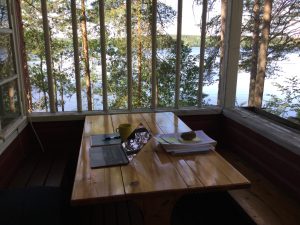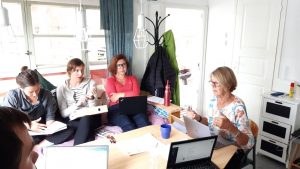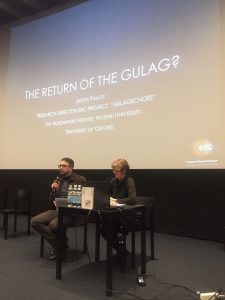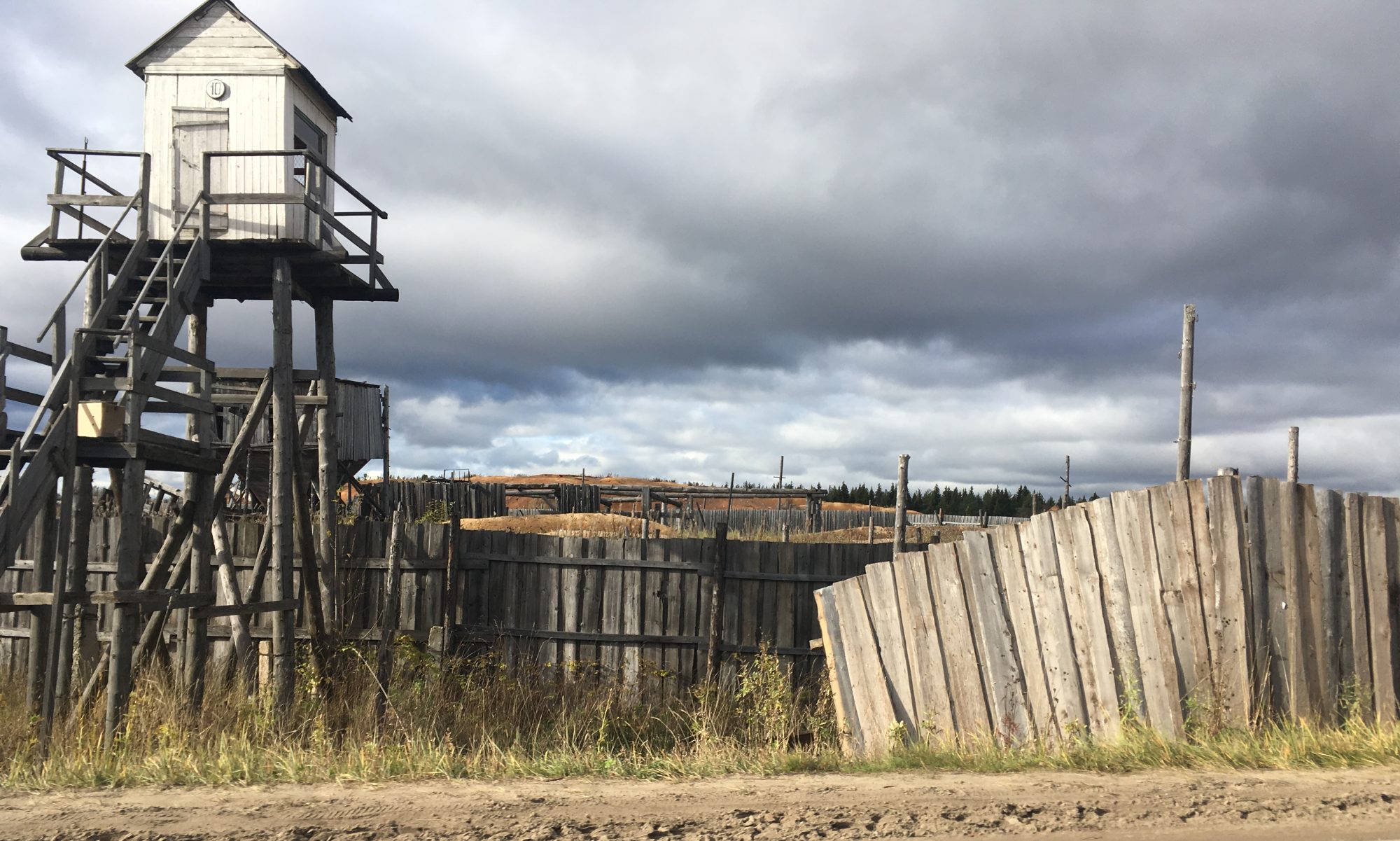The Research Coordinator of the project Dr Larisa Kangaspuro gave the presentation “Nordic-Russian cooperation for improvement social inclusion of foreign inmates”.
Workshop 28.06-01.07.2020 for the project GULAGECHOES: Ethnicity in the Russian Prison System
The third workshop for the researchers involved in the GULAGECHOES project took place 29thJune-1st July 2020. It took place off-site at a venue in Finnish Karelia, which allowed the team to give its concentrated attention to reflect on the progress already made towards the project’s goals and to plan strategically for the year ahead. The meeting took place against the backdrop of the COVID-19 crisis that had brought a halt to fieldwork and data collection in early spring. The closure of international borders meant that some team members had to join by ZOOM, but the core researchers were able to attend in person. The first working day was devoted to the critical analysis of a series of key articles and books on ethnicity, race, and nationalism that had been circulated in advance. This gave us the framework for considering the interview and archival materials that the project has collected to date. The second day was devoted to methodological issues and we were fortunate to be joined by Dr Sofya Gavrilova, who gave a presentation on the ways in which Geographical Information System technologies can be used by the project to visualise our data. On the final morning we discussed the principal findings of the interviews that have been conducted in Russia, Uzbekistan and Georgia.



Preliminary fieldwork trip to Tbilisi, Georgia
At the beginning of March, Costanza Curro, a post-doctoral researcher on the team, spent a week in Tbilisi to do some preliminary research on the prison system in Georgia. Costanza has established useful contacts among academics, social workers and other experts working on topics related to prisons – notably reforms of the penal system occurred since the end of the Soviet Union, and the transformation of prison subculture and its relevance within and outside Georgian prisons. This preliminary strand of fieldwork has laid the foundations for further research in Tbilisi and some of the Georgian regions, which will focus mainly on interviews with former prisoners and will keep into account differences in ethnic background, but also socio-economic position, age, length and type of sentence as well as regional and/or neighbourhood belonging. This research will take two main directions: 1) it will analyse narratives and practices of hospitality in the prison, and detect the role and relevance of ethnicity in them; 2) it will investigate the ethnic dimension of the prison subculture.
Workshop “Identity politics in post-global Nordic societies”, Copenhagen, Denmark
A workshop supported by the ReNEW Excellence Hub and titled “Re-Imagining Norden in an Evolving World” was held on March 3-4, 2020 at the Copenhagen Business School. Dr Larisa Kangaspuro was invited. She gave the presentation “Multi-cultural prison in Nordic countries and Russia”.
The workshop used a historical lens to paint a comprehensive picture of the complex identity-making process of postglobal societies with the purpose of disclosing further theoretical, methodological, and empirical guidelines for further research. Presenters tried to analyse how (re)productions of identity are being mediated in post-globalisation narratives through discourses, memories, and places.
Participants discussed the following themes:
– multiculturalism and globalization
– democracy, governance and law
Sociological fieldwork underway
Dr Olga Zeveleva, a postdoctoral researcher on the team, has started her first stage of fieldwork. She is conducting a series of qualitative interviews with people who have worked for Moscow-based and St. Petersburg-based NGOs. The data Olga gathers during this stage of the project will allow us to analyse discourses produced by civil society organisations and NGOs, in order to understand how these groups of people create categories of vision and division of those drawn into Russia’s penal nexus.
Exciting Prospect of Prison Interviews in Estonia
The project Director, Judith Pallot, and Dr Olga Zeveleva, one of GULAGECHOES post-doctoral researchers, spent the day in Tallinn in discussion with representatives of the Ministry of Justice and Prison Department of Estonia. The purpose of the meeting was to explore the possibilities of conducting interviews in the country’s three prisons in Tallin, Tartu Varga and Viru. The talks were extremely productive. A lot of useful and new information was conveyed about the prison reforms in Estonia and the mentoring and accommodation services that are being developed by the Ministry of Justice to help prisoner re-entry. The prospects for developing the Estonian case study for the GULAGECHOES project look extremely promising. Dr Anna Markina of the Law Department University of Tartu, set up the meeting and we are looking forward to future collaboration with her and with Mr Stanislav Solodov an analyst at the Ministry of Justice who heads up re-entry services.
Workshop “The international co-operation at the Nordic Council of Ministers”, Stockholm, Sweden
The Research Coordinator of the project Dr Larisa Kangaspuro was invited to attend a workshop in Stockholm. “The international co-operation at the Nordic Council of Ministers” was the information’s meeting and workshop on 7 February 2020 regarding Open call programme for Nordic-Russian co-operation and NGO´s in The Baltic Sea Region.
The aim of the meeting was provide all the relevant information for applying for funding, help to build strong partnerships and help to find the right partner.
Archival fieldwork in the State Archive of the Russian Federation (Moscow)
Mikhail Nakonechnyi, a postdoctoral researcher, responsible for historical dimension of the GULAGEchoes project, has started his first archival fieldwork in the State Archive of the Russian Federation (Moscow). The archive contains tens of thousands of case files, which could be relevant to the purposes of the project. Concurrently working with materials of the GULAG, the Ministry of Justice and camp Procuracy, he intends to glean unpublished documents, generated by the Stalinist law enforcement agencies. These unique sources allow to get a multi-institutional perspective on the questions of ethnicity and ethnic relations in the Soviet system of judicial incarceration between 1930 and 1953.
Film under the project’s auspices
January 30-February 1st
Visit of Dmitri Omelchenko from HSE St Petersburg who is scheduled to direct a film under the project’s auspices for use as training in the management of “difference” in the penitentiary system. The purpose was to discuss the current prospects for implementing earlier agreed plans for the filming.
Seminar “Gulag and Finland – History and Memory”
January 29th-30th
Members of the research team attended the two-day seminar on the gulag, “Gulag and Finland – History and Memory” which took place in Helsinki. The first day was consisted of open lectures in the Helsinki public library that were devoted to the experiences of Finnish deportees and prisoners in the Russian gulag. Among the invited guest speakers were Irina Flige from Memorial St Petersburg, Nicolas Werth distinguished gulag scholar from the Sorbonne, Paris and our own Judith Pallot. Judith’s presentation, which was translated into Finnish, discussed the legacies of the gulag in the present day penal system in Russia but cautioning against the overuse of historical parallels
The seminars were followed by film showings that evening and the following day of films about the gulag. The highlight was the showing of the three-hour documentary about the gulag produced by Nicolas Werth, Patrick Rotman and Francois Ayme.

